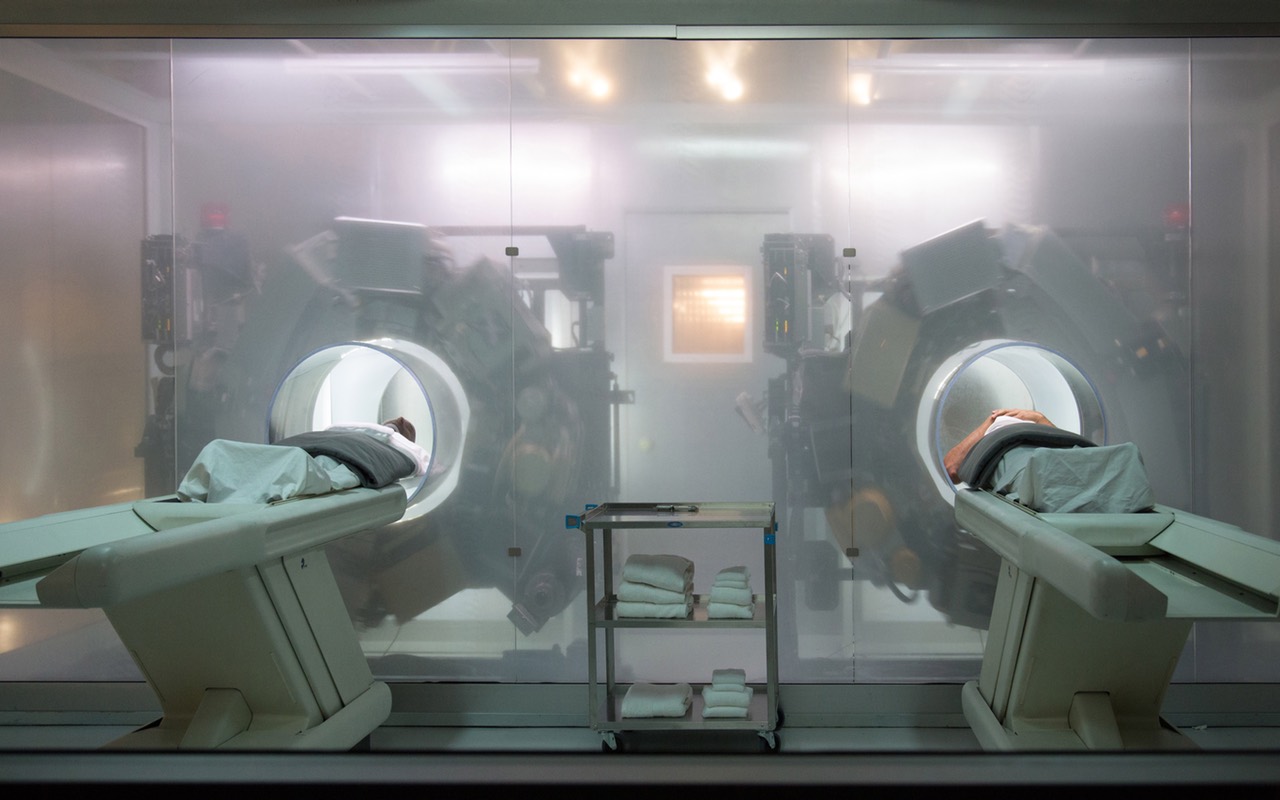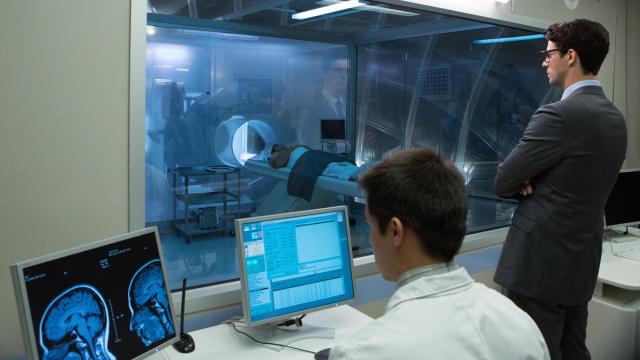The quest for immortality has a long history in futurist circles. What if you could jump from body to body, complete with the same thoughts, the same memories, the same personality as before? That’s the idea behind the new Ryan Reynolds vehicle Self/Less. And while the film won’t change your life, it’s a fine way to spend two hours in the dark, thinking about the future.
Right off the bat, it should be said that there’s virtually nothing in the film about the mechanics of how we might achieve immortality. The movie features a simple, magical device and nothing more. Think two MRI machines, with a human body in each — one containing the consciousness that’s supposed to be transplanted, and another the human vessel that will become the mind’s new home.
The primary consciousness in question throughout Self/Less is that of Damian Hale, a vicious real estate tycoon played by Ben Kinglsey who has more money than God and a terminal illness. The vessel? A body played by Ryan Reynolds who it turns out used to have a consciousness of his own. (If you’ve seen trailers for this movie, this isn’t a spoiler.)
With a wave of the cinematic hands, Hale’s mind is transferred to the body of Reynolds, and he proceeds to do what we’d expect hedonistic billionaires on power trips do. We keep hearing the question of what brilliant men like Steve Jobs would do if given another 50 years. The answer? Apparently go to a lot of clubs and have lots of sex.
But soon, Hale learns that perhaps his new body wasn’t just a vessel manufactured in a lab after all. And pretty soon he’s made to confront the fact that a desperate man with plenty to live for gave up his life for Hale’s second chance.
Viewers are ultimately meant to ponder just how far we’ll go in an effort toward self-preservation — after plenty of sex and fast cars, of course. Would you take a life for a chance at immortality? What kind of unintended consequences would you live with, even if this mind-body swap fit within your own ethical and moral framework?
Director Tarsem Singh is explicit that he didn’t care about the device that actually transports consciousness from one person to another in the film.”If it’s a Tony Scott movie and you have a lot of money, you could build a much bigger machine and go PING and make it louder,” he tells me facetiously. “Let’s show it to [audiences] and say this is the least interesting thing to me.”
Which is not only acceptable, but admirable. Plenty a worthwhile movie was derailed by characters spending unnecessary time explaining the most intricate details of some fictional technology. The question is not how this technology works, but whether anyone would want to use it once some version of it becomes possible.

So what about the implications of this work? Will we be thawing out Walt Disney’s head so that he can rise up and build a capitalist’s paradise, like libertarians predicted back in the 1970s?
The science of Self/Less might be thin, but anyone with half a brain can certainly see that even if we were to develop this technology with the best intentions, there are major pitfalls. One of the ideas behind the film is that if we’re one day able to jump from one body to another it’s only the ultra wealthy and connected who will be allowed to do so.
Beyond that, there are the questions of whether living more than one lifetime will actually help humanity as a whole. I spoke with a neuroscientist, Dr. Charles Higgins, who seems convinced that it will. In his vision it almost sounds like a form of time travel, provided we could upload the great minds of the world into another entity.
“Fundamentally being able to create an artificial intelligence might mean that we could save knowledge from somebody who’s dying,” Higgins tells me. “If all it meant is that we could take a great leader, an artist, an expert, and save what they had learned to go on and teach others. I mean that’s a huge goal right there. What if we could save the best humans from the last century in a computer, if all you got was their knowledge, but you could go talk to Albert Einstein, go talk to Abraham Lincoln, go talk to Steve Jobs. I’m doing a start-up company, what if I could get Steve Jobs’ advice?”
I’m starting to squirm in my chair at this point. When it was on the big screen in Self/Less I was able to let hypothetical ideas wash over me without too much agitation. But here in the real world, the worship of a guy like Jobs doesn’t sit well.
“What if everybody knew all of American and human history and had a political science PhD? Think about how much better the American populace could deal with what’s going in Iraq and Afghanistan,” Higgins tells me. “I mean, what if we were all so well informed we actually understood what to do?”
“But the problem is that some of our greatest minds have gotten us into the biggest clusterfucks in history,” I respond. “So I don’t think I buy that argument.”
“So history tends to repeat itself. It’s not like historians are any better at predicting the future than others, but it seems to me that the very least we can do is be informed about past situations that reflect on current events. And the Vietnam War taught us a lot. And we didn’t forget that when we went to Afghanistan,” Higgins says.
“Are you joking?” I ask a bit more rudely than I probably should have.
“Well, I hope that people coming back from Iraq and Afghanistan are treated better than soldiers coming back from Vietnam were,” he says.
“Oh, sure, the soldiers are treated better,” I concede, believing that we were talking about the mechanics of war, not whether hippies were jerks to Vietnam vets. “But the tactical lessons seemed to have been thrown out the window, because we went to this belief in electronic warfare with the Gulf War and then right back into counterinsurgency warfare in Afghanistan…”
It’s starting to occur to me during this interview that Higgins’ worldview is precisely why I’m fairly uncomfortable with the ideas presented in Self/Less when we take them out of the multiplex. Higgins is no doubt a brilliant neuroscientist. But scientists aren’t necessarily the best people to follow for advice on public policy.
There’s no doubt in my mind that if we did have the ability to transfer our minds into other bodies or machines, Higgins would be helping set that policy. And that terrifies me. We spent the remainder of the interview debating politics, history, and health care policy in the United States.
“Go to England and try to have medical care there,” Higgins says to me. “Why do you think their teeth look funny? Socialised medical care, that’s something I’m glad we don’t have.”
After he explains to me that “perfection has not been achieved” but that the system works, despite millions still without health insurance, my thoughts wander to what a dystopian future Self-Less presents if only the rich and powerful will determine how immortality-like technologies are used. We’re all fucked if the technocractic libertarian utopia of Higgins’ dreams becomes a reality.
Don’t go into Self/Less expecting to learn much new about the future of the human experience. But it’s hard not to acknowledge that it’s a fun jumping off point for a good old fashioned debate about the future of great thinkers and the practical realities of power.
Those with money and influence are the ones who will no doubt control how this mythical consciousness-shifting technology will ultimately be used. Same as it ever was, I suppose — except with 100 per cent more immortality.
